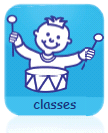 |
Meet the expert – Karen Sherr, founder of Musical Minis is a psychologist and former play specialist at Great Ormond Street Hospital. |

As a mum, you already have an amazing array of skills to help navigate your child through her day-to-day ups and downs. And we bet that you’re already an ace when it comes to refereeing enthusiastic toddlers tussling over toy cars. But why not help your child learn a new skill this Christmas?
With all those exciting new toys and tasty treats around, it’s the perfect time to help her discover the joys of taking turns.
Sharing is a hot topic with mums. It’s absolutely natural for you to want your child to be able to share nicely, but it’s also natural that she simply doesn’t understand that she should just yet. Sharing requires an understanding of other people’s feelings, and babies and toddlers don’t grasp this straight away.
Psychologist and former play specialist at Great Ormond Street Hospital Karen Sherr explains: ‘Babies and toddlers have a strong sense of self. This doesn’t mean they are aware of themselves as individuals, rather that they are naturally self-centred and don’t realise they are separate from everyone and everything else. This means that they have no idea how their actions affect others.’
However, with your help, she can learn. ‘Sharing requires empathy, and that is something that is very difficult for a young child to understand,’ explains Karen. ‘It will only begin to tentatively develop between the age of two and three, and won’t be fully understood until around five years.’ And this is where you come in. ‘Leading by example, you can encourage her to learn to share and show her that sharing can be fun!’
Learn through baby groups
Playgroups, music classes and other gatherings are great places to help teach your toddler about sharing.
‘Exposing your child to an array of toys and items that don’t belong to her is really helpful in showing her how to share,’ explains Karen. ‘In a music class, for example, there will be instruments that are physically shared out so she will see “sharing” in action. Two babies might be given one drum to bang, and so she might begin to understand that some things are more fun with two people. The children will also swap instruments, take turns with different ones, and return them at the end of the session. This all encourages play around sharing, and helpfully gives you examples to refer back to at home. So say, “Why don’t you swap toys now just like we do at music class?”’
Have a sharing snack
You might unwittingly be giving your little one very mixed messages about sharing when it comes to food. And she may find this very confusing. ‘For example, she may offer you a bite of something she’s eating and you pretend to take one. But then if she offers food to another child, and he does take her food, she could well be distraught when this happens. She wasn’t expecting that and so won’t be sharing again!’ says Karen.
‘Later at the dinner table, she offers her mashed potato to everyone and you tell her to eat it herself – but earlier you suggested she share her lunch, so she thinks this sharing makes
you happy and doesn’t understand why she shouldn’t share her dinner too.’
When you look at it in these terms, it’s easy to understand why she might be confused. But there’s an easy answer: introduce a ‘sharing snack’ and call it that. ‘It helps if she has this snack at roughly the same time every day,’ says Karen.
‘For example, if you always take a snack to give to her after nursery, then this can be her “sharing snack”. And if she shares her food with you, take that bite! Otherwise, she might be shocked when someone else does.’
Prepare to share
If your toddler has friends coming over, get her used to the idea of sharing beforehand, and perhaps even looking forward to the idea. ‘Before her friends arrive, chat to her about how much fun it will be to have someone to play with,’ suggests Karen. ‘Ask her which toys she would like to show to her friend and talk about how much her friend will enjoy playing with that toy too.
Take time to sit together and make a pile of toys that she is happy to share. Ask her if there is anything that is very special to her, that she would rather not share, then put this away until later, explaining that her friend might feel sad if she sees it and cannot use it.’
This will give your child time to think about the prospect of sharing these toys, before she’s confronted with the reality of it. ‘If your baby is too young to do this, then make sure you have lots of toys out so that sharing issues are easily solved by distracting with a different toy,’ adds Karen.
Take your own toys
‘If you are going to visit a friend, then take a couple of your child’s toys with you,’ recommends Karen. ‘And when you have friends visiting you, ask them to bring a few toys too. Explain to your child that her friend is bringing items to share as well, and this will help her to feel that it is not just her who is expected to share.
Doing this also makes sharing the actual activity, rather than the consequence of having somebody over to play. And this brings the opportunity to discuss what the friend might be bringing and how it is fun to be able to play with each other’s belongings.’
Share the day away
Another way to make sharing fun, and something she wants to do, rather than has to do, is to share activities throughout the day. ‘It will help her understand that it is nice when you take turns to do something with someone else,’ says Karen.
‘Take it in turns to sing a song, or do a hop as you walk along, or to talk on the telephone. And share when you’re doing tasks too – if you’re using a tea towel, let her have a go.’
And whenever she’s sharing nicely, give her plenty of positive praise. We all know that babies and toddlers love to smile and clap, so use this to encourage the type of behaviour you’d like to see. ‘Smile, clap and tell her, “Well done, lovely sharing,”’ says Karen. ‘Make a fuss, as she will enjoy it and be encouraged to repeat the behaviour.’
Choose a non-share toy
‘It’s perfectly OK for your child to have a toy that she doesn’t have to share,’ says Karen. ‘Don’t you have special items that mean so much that you wouldn’t like to pass them around? So if she has a favourite doll or soft toy and becomes upset if another child takes it away, then make this her special toy.’ And if another child takes it, help her out: ‘Just say, “That’s her very special toy that is just for her,”’ suggests Karen.
Five ways to practise sharing
- Use a timer. Make a game of setting it and encouraging toddlers to swap toys when the ‘bing’ says it’s time.
- Hold a sharing party. Invite friends over and ask everyone to bring toys to swap and share.
- Pick a theme. When a friend is around, put out lots of toys that fit the same theme. If one child gets upset because she wants the farmyard cow, give her the pig and chat about how he lives in the farmyard too.
- Teach her turn-taking talk. Help her learn to ask what she’d like when another child is playing with something she wants: ‘Please can I have a turn?’
- Plan sharing activities. Some tasks make it very easy to share: colouring with friends means that each child will take turns with crayons and may have to wait to get the colour she wants.




